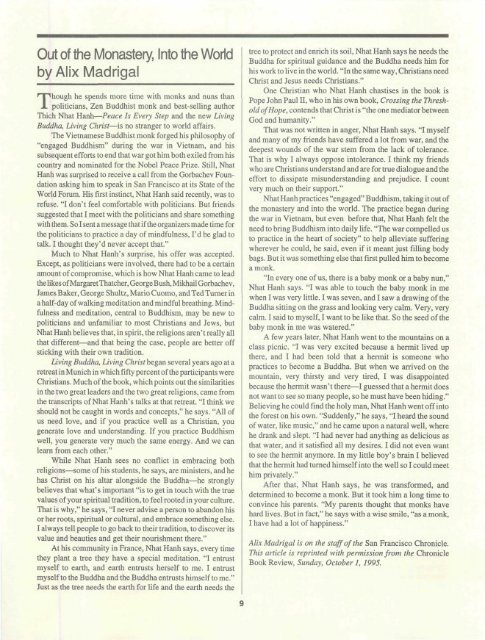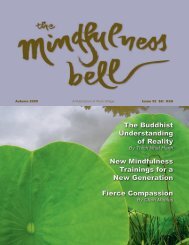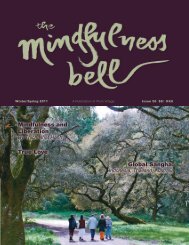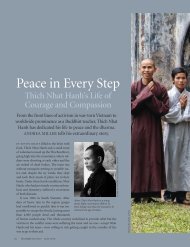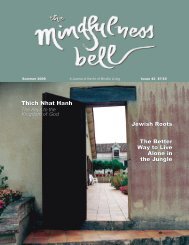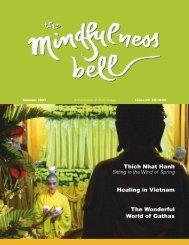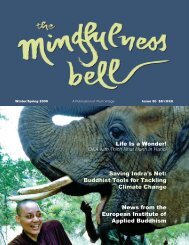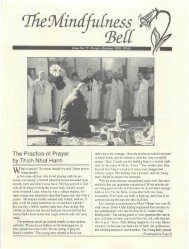J 'Bell - The Mindfulness Bell
J 'Bell - The Mindfulness Bell
J 'Bell - The Mindfulness Bell
Create successful ePaper yourself
Turn your PDF publications into a flip-book with our unique Google optimized e-Paper software.
Out of the Monastery, Into the World<br />
byAlix Madrigal<br />
Though he spends more time with monks and nuns than<br />
politicians, Zen Buddhist monk and best-selling author<br />
Thich Nhat Hanh—Peace Is Every Step and the new Living<br />
Buddha, Living Christ—is no stranger to world affairs.<br />
<strong>The</strong> Vietnamese Buddhistmonkforged his philosophyof<br />
"engaged Buddhism" during the war in Vietnam, and his<br />
subsequent efforts to end that war got him both exiledfrom his<br />
country and nominated for the Nobel Peace Prize. Still,Nhat<br />
Hanhwas surprised to receive a call from the Gorbachev Foundation<br />
asking him to speak in San Francisco at its Stateof the<br />
World Forum.His first instinct,Nhat Hanhsaidrecently, was to<br />
refuse. "I don't feel comfortable with politicians. But friends<br />
suggested that I meet with the politicians and share something<br />
with them.So I sent a message that if the organizers made time for<br />
the politicians to practice a day of mindfulness, I'd beglad to<br />
talk. Ithought they'd never accept that."<br />
Much to Nhat Hanh's surprise, his offer was accepted.<br />
Except, as politicians were involved, there had to be a certain<br />
amount of compromise, which is how NhatHanh came to lead<br />
the likes of MargaretThatcher, George Bush, Mikhail Gorbachev,<br />
James Baker, George Shultz, Mario Cuomo, and Ted Turner in<br />
a half-day of walking meditation and mindful breathing. <strong>Mindfulness</strong><br />
and meditation, central to Buddhism, may be new to<br />
politicians and unfamiliar to most Christians and Jews, but<br />
Nhat Hanh believes that,in spirit, the religions aren'treally all<br />
that different—and that being the case, people are better off<br />
sticking with their own tradition.<br />
Living Buddha, Living Christ began several years ago at a<br />
retreat in Munich in which fifty percent of the participants were<br />
Christians. Much of the book, which points out the similarities<br />
in the two great leadersand the two great religions, came from<br />
the transcripts of Nhat Hanh's talks at thatretreat. "I thinkwe<br />
should not be caught in words and concepts," he says. "Allof<br />
us need love, and if you practice well as a Christian, you<br />
generate love and understanding. If you practice Buddhism<br />
well, you generate very much the same energy. And we can<br />
learn from each other."<br />
While Nhat Hanh sees no conflict in embracing both<br />
religions—some of his students, he says, are ministers,and he<br />
has Christ on his altar alongside the Buddha—he strongly<br />
believes that what's important "is to get in touchwith the true<br />
values of your spiritual tradition, to feel rootedin your culture.<br />
Thatis why," he says, "I never advise a person to abandon his<br />
or her roots, spiritual or cultural,and embrace something else.<br />
I always tell people to go back to their tradition, to discover its<br />
value and beauties and get their nourishment there."<br />
At hiscommunity in France, Nhat Hanh says, every time<br />
they plant a tree they have a special meditation. "I entrust<br />
myself to earth, and earth entrusts herself to me. I entrust<br />
myself to the Buddha and the Buddha entrusts himself to me."<br />
Just asthe tree needs the earth for life and the earth needs the<br />
treeto protect and enrich its soil, Nhat Hanh says he needs the<br />
Buddha for spiritual guidance and the Buddha needs him for<br />
his work to live in the world. "In the same way, Christiansneed<br />
Christ and Jesus needs Christians."<br />
One Christian who Nhat Hanh chastises in the book is<br />
Pope JohnPaul II, who in hisown book, Crossing the Threshold<br />
of Hope,contends that Christ is "the one mediator between<br />
God and humanity."<br />
That was not written in anger, Nhat Hanh says. "Imyself<br />
and many of my friends have suffered a lot from war, and the<br />
deepest wounds of the war stem from the lack of tolerance.<br />
That is why I always oppose intolerance. I think my friends<br />
who are Christians understand and are for true dialogue and the<br />
effort to dissipate misunderstanding and prejudice. I count<br />
very much on their support."<br />
Nhat Hanh practices "engaged" Buddhism, taking it out of<br />
the monastery and into the world. <strong>The</strong> practice began during<br />
the war in Vietnam, but even before that, Nhat Hanh felt the<br />
needto bring Buddhism into dailylife. "<strong>The</strong> war compelled us<br />
to practice in the heart of society" to help alleviate suffering<br />
wherever he could, he said, even if it meant just filling body<br />
bags. But it was something else thatfirst pulled him to become<br />
a monk.<br />
"In every oneof us, there is a baby monk or a baby nun,"<br />
Nhat Hanh says. "I was able to touch the baby monk in me<br />
when I wasvery little. I was seven, and I saw a drawing ofthe<br />
Buddha sitting on the grass and looking very calm. Very, very<br />
calm. I said to myself, I want to be like that. So the seed ofthe<br />
baby monk in me was watered."<br />
Afew years later, Nhat Hanh went to the mountains on a<br />
class picnic. "I was very excited because a hermit lived up<br />
there, and I had been told that a hermit is someone who<br />
practices to become a Buddha. But when we arrived on the<br />
mountain, very thirsty and very tired, I was disappointed<br />
because the hermit wasn't there—I guessed that a hermit does<br />
not wantto see so many people,so he must havebeen hiding."<br />
Believinghe couldfind the holy man, Nhat Hanh wentoff into<br />
the forest on his own. "Suddenly," he says, "I heard the sound<br />
of water, like music," and he came upon a natural well, where<br />
he drank and slept. "I had never had anything as delicious as<br />
that water, and it satisfied all my desires. I did not even want<br />
to see the hermit anymore. In my little boy's brain I believed<br />
that the hermit had turned himself into the wellso I could meet<br />
him privately."<br />
After that, Nhat Hanh says, he was transformed, and<br />
determined to become a monk. But it took him a long time to<br />
convince his parents. "My parents thought that monks have<br />
hard lives. Butin fact," he says with a wise smile, "as a monk,<br />
I have had a lot of happiness."<br />
Alix Madrigal is on the staff of the San Francisco Chronicle.<br />
This article is reprinted with permission from the Chronicle<br />
Book Review, Sunday, October 1, 1995.


